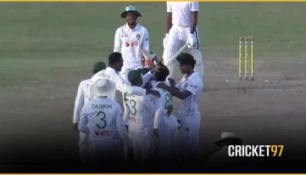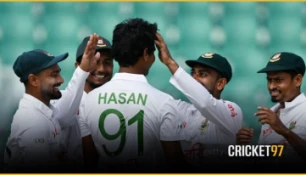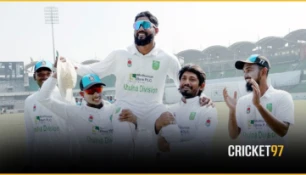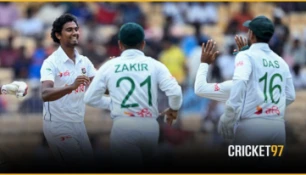The Challenge That Salahuddin is Taking on by Returning to National Team Coaching
97 Repoter: 97author
Publish : 1 week agoUpdate: 1 second ago- 1
Bangladesh Shows All-Round Performance Against Cricket West Indies XI in Preparation Match
- 2
Zimbabwe pick three uncapped players in ODI squad for Pakistan series
- 3
Bangladesh Women’s Team Squad Announced for Ireland Series
- 4
Hat-trick for Hasan Murad, Match drawn
- 5
Star Cricketers Rested by Sri Lanka to Prepare for Test Series
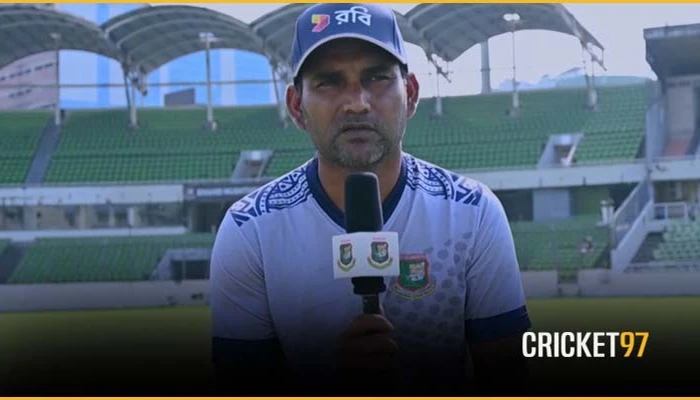
The Challenge That Salahuddin is Taking on by Returning to National Team Coaching
The Challenge That Salahuddin is Taking on by Returning to National Team Coaching
One of the most successful coaches in the Bangladesh Premier League (BPL) and Dhaka Premier Division Cricket League (DPL), Mohammad Salahuddin, has joined the Bangladesh national team’s coaching staff for a second term. The Bangladesh Cricket Board (BCB) has appointed him as the Senior Assistant Coach of the national team until March 15, 2025.
Previously, from 2006 to 2010, Mohammad Salahuddin served as the Assistant Coach and Fielding Coach for the national team. With over two decades of coaching experience, Salahuddin has been motivated to rejoin the Tigers for a specific challenge.
Local coaches are rarely seen at the highest levels of Bangladesh cricket. While local coaches work with age-based teams and High Performance (HP) camps, they’re almost absent in the national team. Salahuddin’s renewed role aims to increase trust in local coaches, paving the way for their work at the highest level.
In an interview on the BCB's official Facebook page, Mohammad Salahuddin stated, “The main reason for my return is that I’ve been hearing about the board’s desire to create a platform for local coaches. If I can show that path, even for a short time, it will prove that local coaches can do well here. This will build trust in local coaches among the board, the public, and the coaches themselves, showing that we can succeed on the international stage. If I can instill this belief, many doors will open for others. Leading my coaching community is now my responsibility, and I see this as a challenge. If I succeed, it will pave the way for many.”
Salahuddin felt this was the right time to rejoin the national team coaching staff, a decision strongly encouraged by BCB President Faruque Ahmed.
Salahuddin explained, “We've been in discussions for a while. I feel that Faruque Bhai played a major role in my decision. He approached me several times, explaining why we need a local coach on the team. It’s mostly due to his encouragement. Though I had my reasons for not coming earlier, now feels like the best time to serve Bangladesh. I want to utilize my coaching experience on a larger scale. If it benefits the country, that would be a rewarding end to my career. I was with the national team for five years before, working with a generation of players like Shakib, Tamim, Mushfiq, Riyad, and Mashrafe. If I can now help the next generation with my experience, it will benefit the players and the country. I’d be happy if I can assist mentally, technically, and tactically.”
Mohammad Salahuddin believes that changing the mindset of Bangladesh's cricketers can enable future players to surpass the legacy built by Shakib, Mushfiq, and Tamim. Only then, he believes, will Bangladesh cricket reach the next level.
Salahuddin stated, “A coach’s job is to guide the players. They are the ones who play on the field. As a coach, my main challenge is to get them to think, to envision a future where they dominate world cricket. If you ask players in the age-based or HP camps about their goals, they’ll say they want to play for the national team. Once they achieve that, they often don’t know how to set new goals. Teaching them to set goals, to motivate themselves to become better players, and to enrich their mindset in and outside the dressing room—all of this is important. Technically, most players are strong. Learning to adapt with time, with cricket, and with different wickets—these little adjustments can ensure their future success. Shakib, Tamim, and Mushfiq have taken us to a certain level. If we can’t break past that, personally, I feel our cricket hasn’t advanced. Our next generation should aim to be even greater players, and if we can guide them toward that, we’ll move forward. It’s not an impossible task either.”




